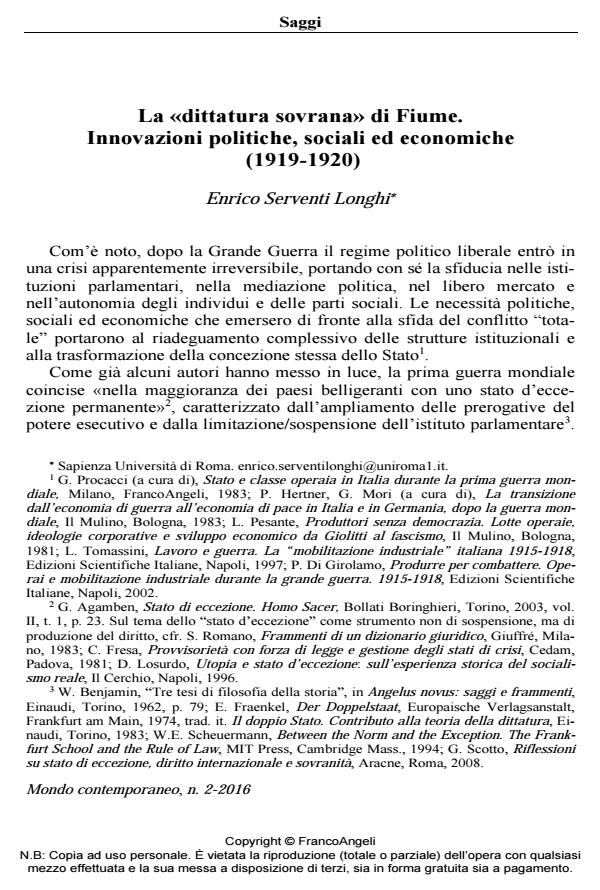Fiume’s «sovereign dictatorship». Political, social and economic innovations (1919-1920)
Journal title MONDO CONTEMPORANEO
Author/s Enrico Serventi Longhi
Publishing Year 2016 Issue 2016/2
Language Italian Pages 29 P. 139-167 File size 252 KB
DOI 10.3280/MON2016-002005
DOI is like a bar code for intellectual property: to have more infomation
click here
Below, you can see the article first page
If you want to buy this article in PDF format, you can do it, following the instructions to buy download credits

FrancoAngeli is member of Publishers International Linking Association, Inc (PILA), a not-for-profit association which run the CrossRef service enabling links to and from online scholarly content.
This research is meant to retrace the handling of provisional governments in Fiume, namely the administration of the city under Italian unauthorized occupation from the end of the First World War (November 1918) to the Treaty of Rapallo (November 1920). After the evacuation of Italy’s regular troops, some groups of volunteers and deserters of the Italian army, led by the military poet Gabriele D’Annunzio, seized the city of Fiume. That episode was one of the most resounding expressions of the crisis of the Italian State and of the sacralisation of politics, as well as society militarization started during the First World War. The illegal government of Fiume became the experimental laboratory of new constitutional, legislative and administrative devices, thanks to a permanent state of military unrest and constitutional exception.
La ricerca ricostruisce il concreto esercizio dei governi provvisori a Fiume, vale a dire le amministrazioni a guida italiana dalla fine della prima guerra mondiale (novembre 1919) al Trattato di Rapallo (novembre 1920). In seguito allo sgombero delle truppe regolari italiane, la città di Fiume fu occupata da gruppi di volontari e disertori dell’esercito italiano guidati dal poeta armato Gabriele D’Annunzio. L’episodio fu una delle manifestazioni più clamorose della crisi dello Stato italiano e del processo di sacralizzazione della politica e militarizzazione della società iniziato durante la prima guerra mondiale. Il governo illegale di Fiume divenne il laboratorio ove lo stato permanente di agitazione militare e di eccezione costituzionale consentì di sperimentare originali strumenti legislativi e amministrativi.
Keywords: First World War, Gabriele D’Annunzio, occupation of Fiume, «sovereign dictatorship», constitutional exception, crisis of the liberal system
- The father of ‘sovereignism’: d'Annunzio in Fiume between the crisis of liberalism and the critique of democracy Enrico Serventi Longhi, in Modern Italy /2022 pp.35
DOI: 10.1017/mit.2021.63
Enrico Serventi Longhi, La «dittatura sovrana» di Fiume. Innovazioni politiche, sociali ed economiche (1919-1920) in "MONDO CONTEMPORANEO" 2/2016, pp 139-167, DOI: 10.3280/MON2016-002005